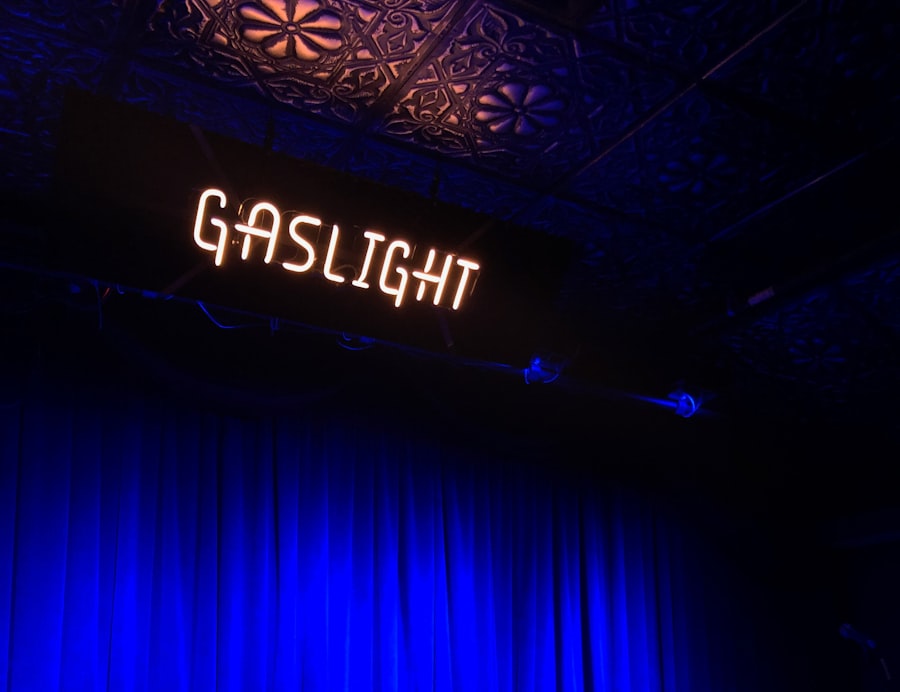Gaslighting is a psychological manipulation tactic that seeks to make you doubt your own perceptions, memories, and reality. The term originates from the 1944 film “Gaslight,” where a husband manipulates his wife into believing she is going insane by dimming the gas lights and denying it when she points it out. This insidious form of emotional abuse can occur in various relationships, including romantic partnerships, friendships, and even professional environments.
Understanding gaslighting is crucial for recognizing its signs and protecting yourself from its damaging effects. At its core, gaslighting is about control. The gaslighter aims to undermine your confidence and self-esteem, making you reliant on their version of reality.
This manipulation can be subtle or overt, often leaving you feeling confused and questioning your own sanity. By understanding the dynamics of gaslighting, you empower yourself to identify when it occurs and take steps to reclaim your sense of self. Awareness is the first step toward breaking free from this toxic cycle.
Key Takeaways
- Gaslighting is a form of emotional abuse that involves manipulating someone into questioning their own reality and sanity.
- Signs of gaslighting in relationships include constant denial and lying, trivializing the victim’s feelings, and projecting the abuser’s behavior onto the victim.
- Manipulative tactics used in gaslighting include isolation, gaslighting by proxy, and withholding information.
- Effects of gaslighting on the victim can include anxiety, depression, and low self-esteem.
- Gaslighting impacts the relationship by creating a power imbalance and eroding trust and communication.
Signs of Gaslighting in Relationships
Recognizing the signs of gaslighting in your relationships is essential for your emotional well-being. One common indicator is the persistent denial of events or conversations that you clearly remember. If someone frequently tells you that you are misremembering or exaggerating situations, it may be a sign that they are trying to manipulate your perception of reality.
This tactic can leave you feeling isolated and unsure of your own thoughts and feelings. Another sign of gaslighting is the use of sarcasm or humor to belittle your concerns. When you express discomfort or confusion about certain behaviors, a gaslighter may dismiss your feelings as overreactions or jokes.
This not only invalidates your emotions but also creates an environment where you feel hesitant to voice your thoughts.
Manipulative Tactics Used in Gaslighting
Gaslighters employ a variety of manipulative tactics to maintain control over their victims. One common method is the use of “love bombing,” where they shower you with affection and attention initially, only to later withdraw it as a means of control. This creates a cycle of emotional highs and lows that can leave you feeling addicted to their approval.
You may find yourself constantly trying to win back their affection, which can further entrench you in the gaslighter’s web of manipulation. Another tactic involves projecting their insecurities onto you. A gaslighter may accuse you of being untrustworthy or overly sensitive, diverting attention away from their own problematic behavior.
This projection not only confuses you but also shifts the blame onto you, making it difficult to address the real issues at hand. By understanding these tactics, you can better recognize when someone is attempting to manipulate your emotions and take steps to protect yourself.
Effects of Gaslighting on the Victim
| Effects of Gaslighting on the Victim |
|---|
| 1. Self-doubt and confusion |
| 2. Anxiety and depression |
| 3. Isolation from friends and family |
| 4. Low self-esteem and self-worth |
| 5. Difficulty making decisions |
| 6. Feeling of being constantly on edge |
| 7. Memory and concentration problems |
| 8. Physical health issues |
The effects of gaslighting on victims can be profound and long-lasting. One immediate consequence is a decline in self-esteem and self-worth. As you begin to doubt your perceptions and feelings, you may feel increasingly inadequate and insecure.
This erosion of confidence can lead to anxiety and depression, making it challenging to navigate daily life or maintain healthy relationships. Additionally, gaslighting can create a sense of isolation. When your reality is consistently questioned, you may withdraw from friends and family, fearing that they will not understand or believe your experiences.
This isolation can exacerbate feelings of loneliness and despair, trapping you in a cycle of emotional turmoil. Recognizing these effects is vital for understanding the importance of seeking help and support as you work toward healing.
How Gaslighting Impacts the Relationship
Gaslighting has a detrimental impact on relationships, often leading to a breakdown in trust and communication. As the victim begins to doubt their own perceptions, they may become less willing to express their thoughts and feelings openly. This lack of communication can create a rift between partners, making it difficult to resolve conflicts or address underlying issues.
Moreover, the power dynamics in the relationship shift dramatically. The gaslighter assumes control, while the victim feels increasingly powerless. This imbalance can lead to resentment and frustration on both sides, further complicating the relationship.
Over time, the emotional toll of gaslighting can result in a complete breakdown of the relationship, leaving both parties feeling hurt and disillusioned.
Gaslighting can manifest in various types of relationships, each with its unique challenges and dynamics. In romantic relationships, the emotional intensity often amplifies the effects of gaslighting. You may find yourself questioning not only your perceptions but also your love for your partner as their manipulative tactics create confusion and doubt.
In family dynamics, gaslighting can be particularly insidious. A parent or sibling may use manipulation to maintain control over family narratives or dynamics, leading to generational patterns of emotional abuse. In these situations, breaking free from gaslighting can be even more challenging due to the deep-rooted connections and expectations within families.
In professional settings, gaslighting can undermine your confidence and career progression. A colleague or supervisor may use manipulation to discredit your contributions or ideas, creating an environment where you feel undervalued and overlooked. Recognizing gaslighting in these contexts is essential for maintaining your professional integrity and mental health.
How to Respond to Gaslighting

Responding effectively to gaslighting requires a combination of self-awareness and assertiveness. One approach is to document your experiences meticulously. Keeping a journal can help you track events and conversations, providing clarity when someone attempts to distort your reality.
This documentation serves as a powerful reminder that your perceptions are valid and grounded in reality. Additionally, assertively confronting the gaslighter can be an effective strategy. When you notice manipulative behavior, calmly express how their actions make you feel without resorting to accusations or anger.
This approach allows you to communicate your boundaries while also challenging their attempts at manipulation. However, it’s essential to prioritize your safety; if confronting the gaslighter feels too risky or unsafe, seeking support from trusted friends or professionals may be a better option.
Seeking Support for Gaslighting
Seeking support is crucial when dealing with gaslighting. You don’t have to navigate this challenging experience alone; reaching out to friends or family members who understand your situation can provide validation and encouragement. Sharing your experiences with trusted individuals allows you to gain perspective on what’s happening and reinforces that your feelings are legitimate.
Professional support from therapists or counselors trained in dealing with emotional abuse can also be invaluable. They can help you process your experiences, rebuild your self-esteem, and develop coping strategies for dealing with gaslighters in the future. Therapy provides a safe space for exploration and healing, allowing you to reclaim your sense of self after experiencing manipulation.
Setting Boundaries to Protect Against Gaslighting
Establishing clear boundaries is essential for protecting yourself against gaslighting. Boundaries help define what behaviors are acceptable and what will not be tolerated in any relationship. Communicating these boundaries assertively can deter potential gaslighters from attempting manipulation in the first place.
When setting boundaries, it’s important to be consistent and firm. If someone crosses a boundary you’ve established, address it immediately rather than allowing resentment to build up over time. By standing firm in your boundaries, you reinforce your self-worth and signal that you will not tolerate manipulative behavior.
Healing from Gaslighting
Healing from gaslighting is a gradual process that requires patience and self-compassion. Acknowledging the impact of gaslighting on your mental health is an important first step toward recovery. Allow yourself to feel the emotions associated with this experience—anger, sadness, confusion—without judgment.
Engaging in self-care practices can also aid in healing. Activities such as journaling, meditation, or spending time in nature can help ground you and reconnect with your sense of self outside of the gaslighter’s influence. Surrounding yourself with supportive individuals who validate your experiences fosters an environment conducive to healing.
Recognizing and Avoiding Gaslighting in Future Relationships
As you move forward from a gaslighting experience, it’s essential to develop skills for recognizing potential red flags in future relationships. Pay attention to how someone responds when you express concerns or emotions; dismissive or belittling reactions are often indicators of manipulative tendencies. Trusting your instincts is crucial; if something feels off in a relationship, don’t ignore those feelings.
Establishing open communication from the outset helps create a foundation built on trust and respect—two essential components for healthy relationships free from manipulation. By understanding gaslighting and its effects on relationships, you empower yourself to recognize unhealthy dynamics and protect your emotional well-being moving forward.
Gaslighting in a relationship is a form of psychological manipulation where one partner seeks to make the other doubt their perceptions, memories, or reality. This insidious behavior can erode a person’s self-esteem and sense of trust over time. For those looking to understand more about the dynamics of gaslighting and its impact on relationships, a related article can be found on Unplugged Psychology’s website. This resource delves into various psychological topics and offers insights into how such manipulative tactics can affect individuals. To explore more, you can visit the article by clicking on this link:



